Words of a Bibliophile
"It's only words, and words are all I have, to take your heart away." —Bee Gees
The Jane Austen Society by Natalie Jenner
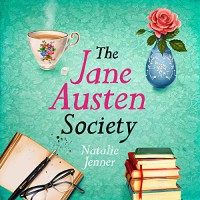
A diverse cast of characters varying in age, origin, occupation and social status band together to preserve the former estate of Jane Austen in postwar England. It has a similar charm to The Guernsey Literary and Potato Peel Pie Society, but in my opinion it's a little less bubbly in tone, a little more somber.
There are several obvious parallels to story lines in Austen's books, including but not limited to a broken engagement (Persuasion), inheritance laws favoring male relatives instead of direct female descendants (Sense and Sensibility), and falling in love with a cad (multiple Austen novels, if not every one of them). I had some minor quibbles with narrator Richard Armitage (of The Hobbit movies fame) but in general he does a great job with the different accents and voices required for the characters.
While the story's pacing can feel a bit slow, I was rooting for the characters to achieve their goal and to find happiness in spite of personal losses and hardships. There are a few twists and a surprise pairing that I didn't see coming, and the delightful, heartwarming ending made me bump this up from 3.5 to 4 stars. I wonder if it's time for me to reread another Austen novel.
Inside Jobs: Tales from a Time of Quarantine by Ben H. Winters

As a short story collection set in the current times of staying at home, this book oddly tries so hard to avoid mentioning the coronavirus. It talks about a global health emergency and physical distancing but skirts around to avoid saying the actual reason behind the quarantine in which the characters find themselves. The first story is straight humor and Scott Aiello as the narrator does a great job. The second one is a bit of an odd thriller, but the narrator speaks so slowly I had to speed it up. The third story is more on the light side for a suspense/thriller and the narrator is okay. All in all not bad for a free audio original, but I've listened to more memorable ones.
Juru Masak Para Maiko by Aiko Koyama
Komik ringan ini mengambil latar belakang kehidupan maiko atau calon geiko (lebih dikenal sebagai geisha) di kota tua Kyoto. Di balik sebuah wisma tempat tinggal para maiko ada seorang gadis muda berusia 16 tahun bernama Kiyo, yang tadinya menjalani pelatihan untuk menjadi maiko tapi gagal karena dinilai tidak berbakat. Ternyata Kiyo memiliki bakat lain dan menemukan tempatnya sebagai juru masak di wisma yang mendukung kehidupan dan pekerjaan para maiko dengan memasak berbagai hidangan lezat untuk mereka setiap hari.
Jenis komik ini adalah slice-of-life yang menghadirkan sekelumit kisah sehari-hari dalam bab-bab pendek. Panjangnya kira-kira hanya 10 halaman per bab sehingga setiap jilid komik ini memang terasa tipis. Tidak seperti manga lain tentang masak-memasak yang pernah saya baca, misalnya Yokohama Chinatown Fantasy yang menyertakan resep masakan di setiap akhir bab, komik ini tidak begitu dalam membahas tentang masakan dan hanya menyebutkan sedikit anekdot dari kehidupan pribadi sang komikus tentang hidangan yang dibahas tiap babnya.
Perkembangan plot komik ini terasa lambat karena sifatnya sebagai kisah slice-of-life yang berfokus pada kehidupan sehari-hari tanpa konflik besar atau arah tertentu yang menjadi tujuan cerita. Terlebih lagi komik ini juga sering kali mundur ke belakang untuk menceritakan kehidupan Kiyo dan sahabatnya sejak kecil, Sumire (Suu), di daerah asal mereka di Aomori sebelum keduanya pergi merantau ke Kyoto untuk berlatih menjadi maiko. Saking lambatnya plot, ringkasan cerita di sampul belakang jilid ke-2 sampai ke-5 terjemahan Indonesia komik ini terus-menerus menyebutkan hal yang sama: Kiyo gagal menjadi maiko tapi beralih jadi juru masak, sementara Sumire menapaki jalan sebagai maiko. Penambahan karakter baru yang menambah konflik pun sangat jarang terjadi. Baru di jilid ke-6 (jilid terbaru yang saya baca) ada karakter calon maiko baru yang meramaikan suasana.
Komik ringan dan singkat tentang makanan seperti ini tentunya tidak akan membahas topik yang terlalu berat, tapi ini menimbulkan kesenjangan antara hal-hal yang disebutkan dan yang tidak. Saya tahu bahwa, tidak seperti anggapan sebagian orang, maiko dan geiko/geisha lebih merupakan seniman pertunjukan tari dan musik, dan tidak sama dengan prostitusi. Namun, tetap saja profesi ini terasa paling tidak menyerempet atau mendekati prostitusi karena kliennya sebagian besar pria yang lebih tua yang berperan sebagai 'patron' mereka. Sempat disebutkan bahwa di distrik puspa tempat kerja maiko dan geiko dilarang keras memasak masakan seperti kare Jepang yang aromanya mengingatkan pria tentang rumah. Kenapa begitu, hayo? Cobalah kita pikirkan dengan kritis.
Yang juga mengganjal dalam komik ini adalah fakta bahwa para kandidat maiko merupakan anak perempuan di bawah umur yang baru lulus SMP. Mereka pada dasarnya putus sekolah dan menjalani pelatihan penuh waktu setiap hari untuk kemudian bekerja sebagai maiko, dengan klien yaitu bapak-bapak lebih tua yang disebutkan tadi. Selain mempertunjukkan tarian untuk menghibur tamu, salah satu bagian pekerjaan maiko adalah menyajikan minuman beralkohol kepada tamu meskipun mereka sendiri masih di bawah umur. Saya bertanya-tanya ada atau tidakkah hukum tenaga kerja anak di Jepang yang mengatur hal ini.
Terlepas dari aspek yang patut dipertanyakan, komik ini berfokus pada hubungan antar manusia terutama persahabatan antara Kiyo dan Sumire. Meskipun Sumire berhasil menjadi maiko dengan nama resmi Momohana sementara Kiyo yang tidak lolos pelatihan beralih menjadi juru masak di wisma, hubungan mereka tetap erat. Kiyo mendukung Sumire dan penghuni wisma lainnya dengan memasak hidangan yang memberi mereka semangat di tengah keseharian yang melelahkan, dan menjadi penyokong yang penting di belakang panggung para maiko. Makanan juga menjadi jembatan nostalgia yang mengingatkan Kiyo dan Sumire tentang kampung halaman. Kehangatan persahabatan dan kebersamaan para penghuni wisma yang tersampaikan melalui makanan, minuman dan camilan lezat menjadi pesona tersendiri dari komik ini.
Final Girls by Riley Sager

Basically a slasher movie in book form, complete with dumb decision-making and shallow college students. It has a few good misdirections and an unexpected (for me) final reveal, but the path to get there feels convoluted. The narration for the flashbacks sounds rather unnatural and robotic, although I suppose it's meant to come across as eerie.
The Nanny by Gilly Macmillan
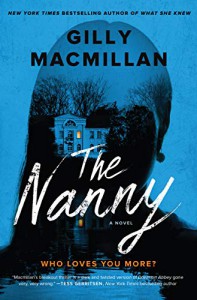
This thriller reveals some of its secrets early on, but keeps others hidden enough to make it interesting. I liked how the story switches between points of view and lets us see things from the angles of different characters. The author cleverly subverts our expectations and notions about them, possibly even causing us to change who we sympathize with along the way. The art subplot is not very necessary, though, and goes on for a bit too long in my opinion. There is also at least one story thread that is dropped halfway and remains unresolved.
The narrator for Virginia's chapters isn't very good at making different voices without them sounding exaggerated, and her attempts at a 10-year-old girl with an American accent sound especially comical. Other than that, I enjoyed the narration. The standout in particular are the parts where we get to know the thoughts of the absolutely psychotic villain. These are exquisitely narrated and are quite chilling.
The Getaway by Greer Hendricks & Sarah Pekkanen
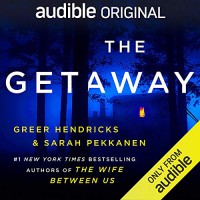
The Getaway; or, How Many Red Flags Do You Need Before You Realize You Have to Get Out of There ASAP. A little ridiculous, but luckily it's short.
Sourdough by Robin Sloan

Having read Sloan's first novel, Mr. Penumbra's 24-Hour Bookstore, I knew to expect something quirky, but this one is more bizarre than I thought. It's only around 6 hours on audio but felt longer. I liked the parts about Lois learning to make sourdough bread and how it invigorates her. It's when she joins a strange underground market that the story goes a little off for me. The novel's summary describes a fusion between food and technology, similar to the way Mr. Penumbra combines books and IT, but I didn't expect the way it morphs into a bit of science fiction — or maybe even fantasy? I'm not sure. It's still quite charming though, and some funny parts did make me chuckle.
What helps this book is having Thérèse Plummer as the narrator. Her engaging delivery makes Lois' excitement over bread-making infectious. However, she has a distinct way of pronouncing certain words which makes me wonder if it's a kind of regional US accent — which I'm not very familiar with since I'm not from the US. A lot of her [i] vowels sound more like [e] or [ei]. For instance, she pronounces 'me' closer to 'may', kind of like that Justin Timberlake 'it's gonna be May' meme. I'm just a linguistic nerd who notices these types of things.
Second Skin by Christian White
This mystery/thriller is quite intriguing until a little over the halfway mark. Then some things seem to come out nowhere, and the final twist feels like an easy way out that stretches believability. The narrator's delivery is all right apart from a slight lisp when pronouncing words ending with 's'.
Magpie Murders by Anthony Horowitz
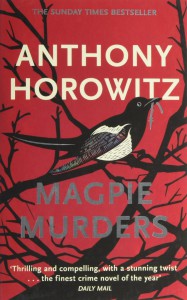
This murder mystery novel containing another full murder mystery novel within it does justice to the classic Agatha Christie tradition to which it pays homage. It starts with an editor reading the manuscript of a novel, Magpie Murders, starring Poirot-inspired detective Atticus Pünd. This book-within-a-book annoyingly cuts off just before Pünd reveals the murderer. It then switches to another mystery concerning the sudden death of the writer of Magpie Murders, before the two story lines converge at the end.
Both of the audio narrators do a good job, although the male narrator's gravelly voice is actually not one I would prefer to listen to for hours on end. It was a bit of a challenge for me to remember all the suspects in not one but two mysteries without having the written word to refer back to, but I somehow managed to do it. Whether I was able to guess the murderers is a whole other question. (I wasn't, but that's the fun of mysteries.) Overall it's a clever and entertaining work of metafiction with interesting discussions on whodunits and why they are so appealing to their fans.
The Travelling Cat Chronicles by Hiro Arikawa

It was pretty easy for me to guess where this simple, quiet novel is heading from the moment I read the synopsis. The anthropomorphic narration of the proud, wisecracking cat Nana is pretty funny. I would argue that human-animal relationship is not the novel's main topic and only serves as a background for the greater theme of interpersonal human connections. Despite the outcome being clear from the get-go, I was still quite touched by the ending.
Tell Me Lies by J.P. Pomare
This was one of the free Audible Originals for March, and while I listened to it later, I'm glad I picked it up at the time because it turned out to be my favorite from the Originals I've checked out so far. Set in Australia, this is a psychological thriller/mystery with actual psychological analyses which I find fascinating.
J.P. Pomare gives just enough twists and turns to both lead and mislead me, before delivering a final punch at the close. The narrator Aimee Horne is exceptional and has this eerily calm quality to her reading that is perfect for the quietly suspenseful moments in the story. Looking forward to check out more from both the author and the narrator.
The Seven Husbands of Evelyn Hugo by Taylor Jenkins Reid

For a novel that's supposed to be about movie stars in old Hollywood, I came away with little about actually making the movies. We get more about publicity stunts, behind-the-scenes lobbying, and award shows rather than about film-making itself. Even entering the industry seems like only a matter of moving to California and being pretty and hanging around studios; voila, you get cast as an extra. The writing is simpler than I expected and felt very condensed (perhaps due to the story spanning several decades, but I've seen it done better) and there's a lot more telling than showing.
(show spoiler)
What I liked was the themes running through the novel, including identity and female sexuality. The connection between Evelyn and her biographer Monique is unexpected and more complicated than I thought it would be.
The Golden Orchard by Flora Ahn
This family-friendly modern fantasy starts out as an intriguing take on time travel and ends with some confusing twists that don't make sense and break the story's own established rules. Probably because this is the narrator's first time doing an audiobook, the narration is a bit all over the place, like sometimes using the same changed tone for a piece of dialogue as well as the 'she said/he said'. However, I did like the theme of familial bond and the descriptions of cooking delicious Korean food. It made me crave some gimbap.
The Other Mrs. by Mary Kubica

I thought that I had most of the story figured out and that other things are merely red herrings put there to distract the reader. Since a big twist was already obvious to me from early on, I thought some plot lines go on for too long with too many details. I was right about that twist but it turns out I was too distracted to see another one coming, and it pulled the rug from under me. Despite some believability issues, the book earns extra kudos for managing to bring me down a peg when I thought I was too smart for it. My only problem with the audio is how the female narrator bugs me when she pronounces "been" like "ben".
Why We Sleep: Unlocking the Power of Sleep and Dreams by Matthew Walker
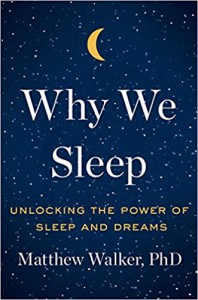
A very informative look on the power of sleep to maintain our physical, mental and emotional health and wellbeing. It took me longer than expected to get through the book, although it's not lengthy or written in a complicated way. In fact, as a science-based book it's very accessible and quite humorous at times despite the gloomy prognosis of what lack of sleep can do to you. Maybe it's just me, but I got a bit bored at some point and preferred to switch to a novel instead. I also think some parts might need more references and examples to be more convincing.
That said, it's still a really eye-opening read which made me think about my own (sometimes poor or inadequate) sleep and how it can be better. I found myself often telling people near me interesting tidbits from the book as I was reading, which is a sign of a good nonfiction for me.
Before She Knew Him by Peter Swanson
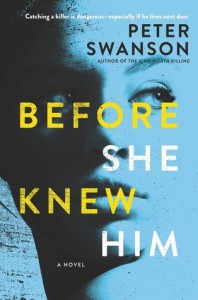
A pretty good thriller/suspense, that goes to darker places than I thought it would. I was able to predict the big twist, but it's a good twist nonetheless. The resolution is a bit underwhelming, though. The female narrator's pronunciation isn't exactly my favorite, but otherwise the audio is fine.


